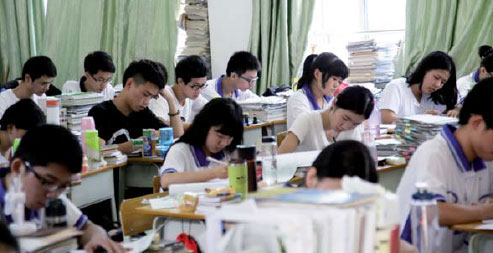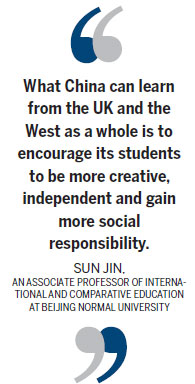School for thought
Updated: 2015-08-28 08:28
By Zhang Zhouxiang and Zhang Chunyan(China Daily Europe)
|
|||||||||||
 |
|
Students prepare for gaokao, the national college entrance exam, in Guangdong province. [Photo provided to China Daily] |
"Western education looks very loose and happy, no pressures. Even some Chinese parents and children admire it," Chu writes, adding that Western children from rich families normally put more effort into study by going to private schools, something children from ordinary backgrounds can't do.
The Chinese education system gives people more opportunity to join the elite through discipline and hard work, Chu says.
Charles Law, an English teacher points out: "It's confusing to be told you are perfectly OK when the reality is that you need to improve to compete with your peers. Short term you might feel better. Long term you won't progress. It is far better to instil determination and perhaps set a long-term target (6 months) and make the necessary improvements."
Even with the huge differences that were shown in the program, many British netizens and viewers claim that the documentary reminded them of past school-days, as the discipline and some of the Chinese methods were present in the British education system decades ago, and still are at the private schools.
"That's not the 'traditional Chinese method'; it's the 'traditional method'. It's how I learned decades ago, and guess what? It worked. 'Discovery learning', or whatever you want to call it, hasn't reinvented the wheel," one netizen named Alfred Greengrass said during one British online debate, winning him 1,198 "likes".
Cat Smith, a British student, says in the UK's Open University online debate on the subject: "I think British students and state schools can learn a lot from the Chinese system." She added that her school has a lot in common with the Chinese system.
"In my experience, as I have attended many schools, it is the private schools that have these traditional rules in place to show respect to those above you and which have very set rules in place that do not tolerate any disrespect or behavioral problems," Smith says.
Joanna Dodd, director of a London-based PR group, has two adopted Chinese daughters both going to King's Rochester, an independent school in the south of England. The two girls, Wan Mae Dodd and Mei Dodd, are 13 and 10 respectively.
"Our school expects very good behavior: be on time for class; don't run in corridors, put your hand up to ask a question, hand your homework in on time, don't talk when the teacher is speaking to the class, mobile phones switched off during the school day," one sister says, citing the strict disciplinary requirements of the school.
"You can also get detention during or after school or may have to come in on a Saturday."
Besides comparing education systems in the two nations, more viewers, experts and teaching practitioners focused on the documentary itself, calling it a reality show and questioning the idea of reaching any conclusion from a simple one-month experiment.
The BBC took six months to select qualified Chinese teachers, Chinese media reported. The teachers had to have five years teaching experience in China covering English, mathematics, science or social sciences. They also had to be able to teach in English. And the five teachers were told by the BBC that they need to teach in a strict and very typical Chinese way.
But actually only Zou Hailian and Li Aiyun, two of the five, were recruited directly from the Chinese mainland, and the other three have lived in the UK for a long period. This led the audience to start asking: Are the teachers all using the current Chinese method?
Wang Xuming, a former spokesman for the Chinese Ministry of Education and now president of Language and Culture Press, says: "It (the BBC series) is an entertainment program, and the five teachers do not represent the majority of teachers in China.
"The five teachers are excellent in certain aspects, and their 'Chinese style', which includes penalties for disobedient students and harsh scolding for their faults, exists among some Chinese teachers, but definitely not all," he says, pointing out that some of details in the documentary, like the male teacher Zou scolding a student for "embarrassing the school", are no longer practiced by the majority of teachers in China.
Today's Top News
Hundreds die as desperate migrants head for Europe
Why China will have a 'soft' landing
All creatures great and small help keep V-Day parade safe
Class: Worlds apart, but
learning together
Ministry denies troops sent to reinforce DPRK border
Property investment rules eased
Apple may launch new iPhones at Sept 9 event
Hungary scrambles to confront migrant influx
Hot Topics
Lunar probe , China growth forecasts, Emission rules get tougher, China seen through 'colored lens', International board,
Editor's Picks

|

|

|

|

|

|







